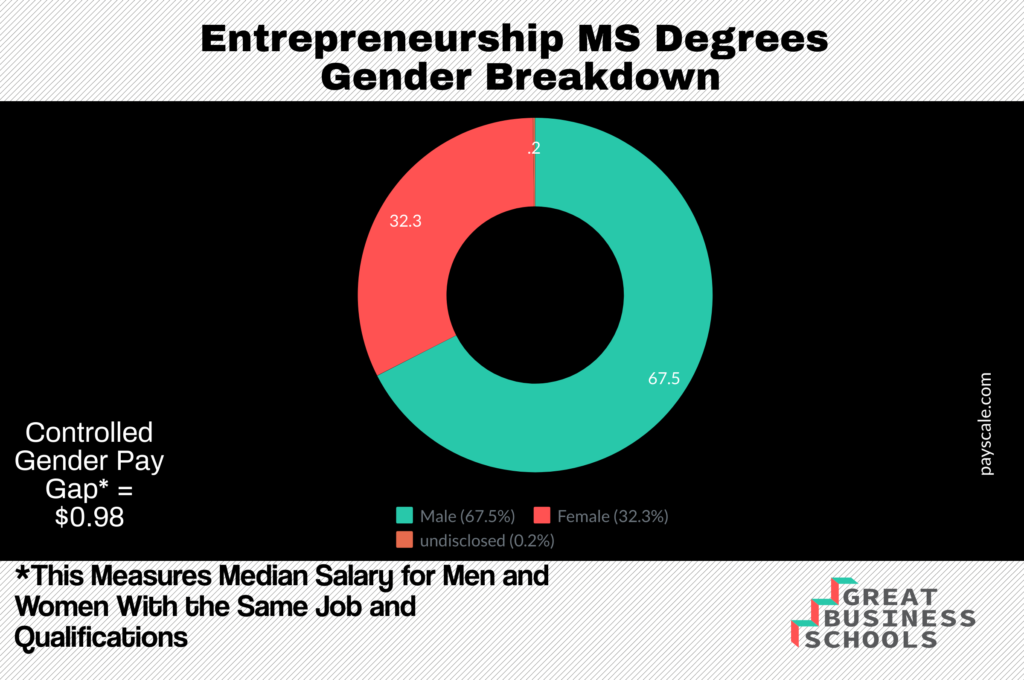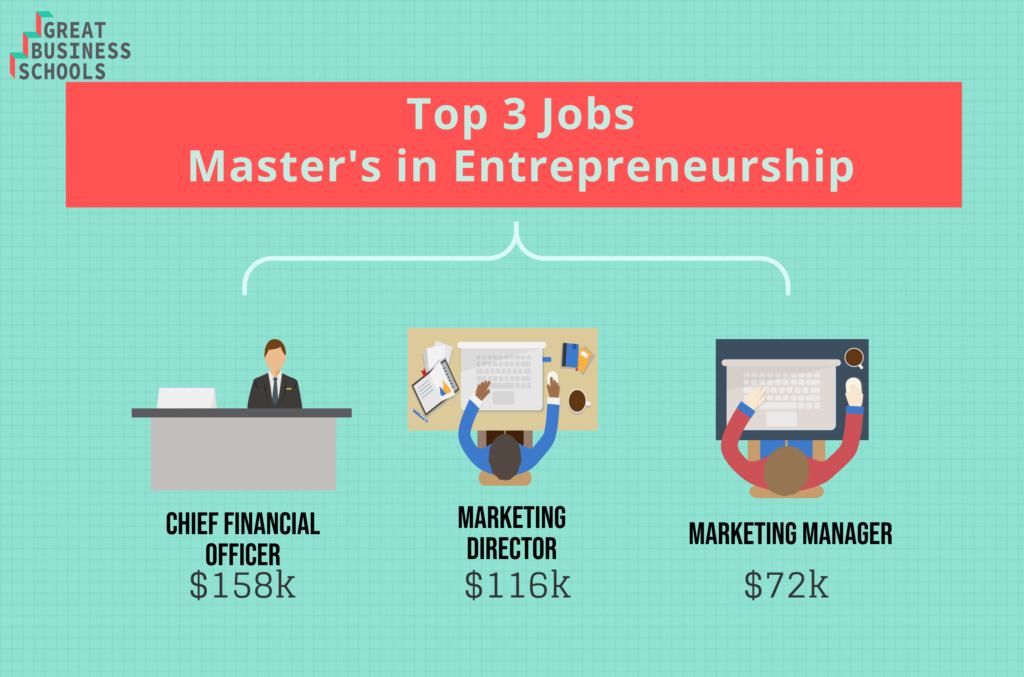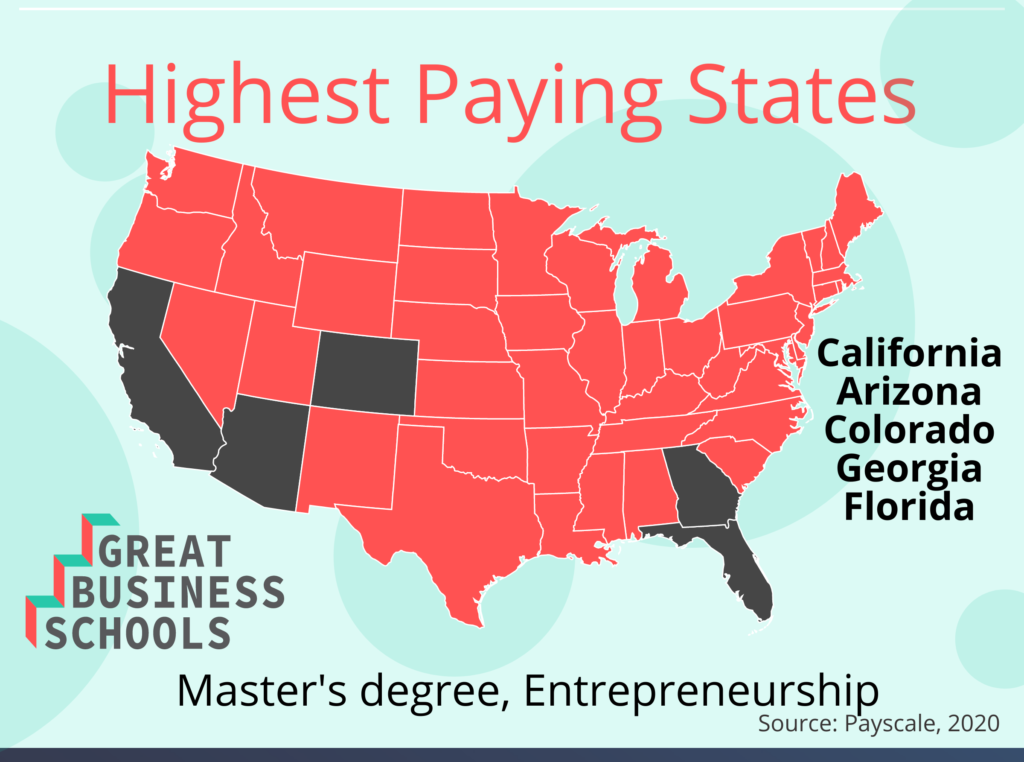If you have been considering earning a graduate degree in entrepreneurship, you have likely asked yourself these questions on your quest to select the best school, degree, and program –
- What is a masters in entrepreneurship?
- Is a masters in entrepreneurship worth it?
- Should I get a masters in entrepreneurship?
Entrepreneurs are trained to calculate the risk/rewards of starting a new business or product opportunity. In some respects, an entrepreneurial career is the epitome of capitalism – taking an idea and bringing it to an inherently competitive economy but doing so with profits.

But, note, not everyone is cut out for a career as a professional entrepreneur. And while entrepreneurs can, and often do, create tremendous wealth, there is an enormous amount of work and education required to hone the skills necessary to become a successful entrepreneur. An entrepreneur must be committed, dedicated, smart, a risk-calculator/taker, motivated, and have a knack for working alongside people with little or no conflict.
Accreditation for Business and Entrepreneurship Programs
Accreditation plays an integral part and essential function in support of the U.S. educational system, with the ultimate objective of keeping academic programs accountable and improving the quality of education across the country.
Accreditation and its processes act as a quality assurance process. A third-party (notably, a disinterested party) professionally evaluates the operations and the services offered to determine and verify if the program/school in question meets the pre-defined, recognized educational criteria.
The accreditation agency awards an accredited status if the program and/or school meets the mandated standards. Any program or school that has received accreditation has demonstrated it meets critical education criteria, as set forth by the accrediting body.
From a student’s view, a school or program that has earned accreditation offers students the assurance they need that the education that is advertised/promised is the education/degree delivered. To simplify its objective, some compare accreditation to that of an earned gold star.
In the U.S., there is more than one level of accreditation. The broadest accreditation type is known as regional accreditation.
Regional Accreditation
The USDOE – the United States Department of Education maintains nine regional oversight agencies across the country. The United States DOE is then tasked with the responsibility of establishing the criteria that must be met by each school seeking regional accreditation. Each regional agency is charged with the responsibility of determining if the schools in its region meet or exceed specific content and merit standards. For the most part, regionally accredited schools are predominantly state-funded, nonprofit institutions of higher education.
In addition to regional accreditation, schools, and programs in the United States can voluntarily seek specialized accreditation. Although this is not a requirement, most quality institutions of higher learning seek and obtain specialized accreditation.
Specialized Accreditation
Specialized accreditation is typically performed by industry-approved oversight agencies sanctioned to specifically perform accreditation evaluations.
So, if you are researching and looking for the best entrepreneurship masters programs offered on-campus or the best online entrepreneurship degree programs – be sure that the program you select to attend is not only the best online masters programs in entrepreneurship for you but is also an accredited online entrepreneurship degree program.
At present, the field of entrepreneurship has no program-specific accreditation standards; however, many of the graduate entrepreneurship degrees are offered through business schools or in conjunction with a Master of Business Administration (MBA) degree program. As such, accreditation for business programs is generally awarded by –
- The AACSB – the acronym the represents the Association for the Advancement of Collegiate Schools of Business – the most widely accepted accreditation for business education programs.
- The ACBSP – the acronym the represents the Accreditation Council for Business Schools and Programs.
- The IACBE – the acronym the represents the International Accreditation Council for Business Education.

Types of Entrepreneurship Master’s Degrees
By training, an entrepreneur is adept at converting a business or idea into an economic opportunity that turns a profit. Most entrepreneurs begin their education with a baccalaureate degree, but job opportunities increase when earning an on-campus or an online master’s in entrepreneurship degree. If you have a strong interest in creating and operating your own business, an on-campus or online master’s degree in entrepreneurship may be the ideal degree to meet your career objectives.
Fortunately, there are many different masters in entrepreneurship online degree options from which to choose. As noted above, it is a prudent idea to ensure the masters degree in entrepreneurship online degree you select has received appropriate accreditation.
Masters in Entrepreneurship Online Degree Options/Academic Tracks/Concentrations
There are many specialties and academic tracks offered by an online master’s in entrepreneurship degree program – either as a straight graduate degree or in conjunction with a Master of Business Administration (MBA) degree. These include –
- Accounting and accounting related services.
- Business Architecture.
- Sustainability Strategy & Implementation.
- Economic Development.
- Social Entrepreneurship.
- Family Business.
- Cybersecurity Leadership Intelligence.
- Finance.
- Applied Technologies.
- Health Care Innovation.
- Innovation/Entrepreneurship.
- Human Resource Management.
- Consulting at Various Levels of Management.
- Negotiations.
- Business Law and other legal aspects of a business.
- Public Administration.
- Technology Entrepreneurship.
- Marketing and Advertising.
- Supply Chain Management, to name a few.
Certifications/Licenses
Several entrepreneurship certification and licenses are available by a number of professional organizations in support of the entrepreneurship industry and its professionals. If you have been considering –
- Earning a Certification in Entrepreneurship or a graduate certificate in entrepreneurship.
- Enrolling in one of the many quality entrepreneurship certification programs.
- Attending a program offering an online graduate certificate in entrepreneurship.
Options for Entrepreneurship Certification
The International Business Innovation Association (InBIA)
The International Business Innovation Association is a nonprofit professional organization that offers professional entrepreneurs support in more than 25 countries. In addition to its lauded certification in entrepreneurship – the Entrepreneurship Center Management Certificate (ECM), InBIA offers is 1,100+ members –
- Improved business practices through –
- Education opportunities.
- Mentorship and collaboration.
- Job Sharing.
- The Encouragement of idea sharing across the globe.
The Entrepreneurship Center Management Certificate
Since 2006, the International Business Innovation Association has been offering industry certificate programs and credentials to entrepreneurial professionals.
The Entrepreneurship Center Management Certificate (ECM, known initially as BIM – the Business Incubation Management Certification Program) is considered one of the premier entrepreneurship graduate certificate credentials in the industry – recognized across the world. Individuals interested in obtaining the ECM graduate certificate in innovation and entrepreneurship are required to complete four International Business Innovation Association courses that cover, in part, the following subjects/topics –
- Marketing techniques.
- Creating profit making pricing models.
- Targeting programming and services in technological savvy markets.
- Effective coaching and executive, managerial motivation techniques.
- Entrepreneurial ecosystem development.
- Fundraising implementation and follow up.
- Practical acquirement of facilities and tangible assets.
Entrepreneurship certification candidates study cases from around the globe and have access to tremendous resources from international members and educators.
The Entrepreneurship & Small Business (ESB) Credential
The Entrepreneurship and Small Business (ESB) credential another entrepreneurship certificate that is popular among entrepreneurial professionals. Certiport administers the Entrepreneurship and Small Business (ESB) by way of a 45-question test that covers essential topics in entrepreneurship and business that include –
- Managerial Operations.
- Sales Operations.
- Organizational Operations.
- Business Management.
- Business Startups.
- Marketing, to name a few.
The Institute of Management Consultants (IMC)
The Institute of Management Consultants offers another entrepreneurship certification available to experienced entrepreneurial professionals. Eligible management consultant certification candidates must possess at least three years of managerial consulting professional experience, pass an exam, and submit client evaluations to the IMC acceptance board.

Careers with a Master’s in Entrepreneurship
Over time, entrepreneurs have been responsible for developing some of the most successful and innovative businesses throughout history. Much of their success can be sourced to their ability to not only accurately identify, but tolerate calculated risks, the ability to be remarkable motivators/communicators, and a knack for great timing and decision-making. As such, entrepreneurs find great success from both their innate skills and the academic training they receive.
Many entrepreneurs apply their skills to creating and operating businesses, which includes multiple business responsibilities – therefore, entrepreneurs are a prime example of the business executive who successfully juggles many jobs/responsibilities. So, if you are ready to answer these questions –
- What are the jobs you can get with a masters in entrepreneurship?
- What are my options for available careers with a master in entrepreneurship?
- Are there masters in entrepreneurship jobs near where I live?
- What kind of masters in entrepreneurship job opportunities are available with my educational background?
- What jobs can you get with a masters in entrepreneurship that would meet my financial obligations?
The reality is, there is a broad selection of jobs for masters in entrepreneurship degree holders. The good news is that your preferences and choices can lead you to any one of these masters in entrepreneurship careers –
- A Business Consultant – an entrepreneurial consultant facilitates the assessment and growth of many types of businesses. They study a company’s current status, analyze relevant data, and make recommendations to stakeholders/owners.
- A Marketing Consultant/Expert – many entrepreneurial graduate degree holders facilitate the development and strategize to bring new products to market or re-develop existing products to improve sales.
- A Market Researcher – entrepreneurs interested in research often work in market research, compiling relevant data (including comparisons of competitor products) in an effort to advise and recommend strategies that improve company sales, and thus, profits.
- A Human Resource Manager – entrepreneurial degree holders who wish to work in human resource management are tasked with the responsibility of handling a company’s compensation programs, benefits packages, and performance/enhancement programs.
- A Product Developer – entrepreneurs who prefer the more creative side of the business may elect to be involved in product development – designing products, testing products, complying with industry/government guidelines, and marketing products, until the product launches.
- A Financial Analyst – entrepreneurs who prefer to work in finance help manage and guide a business by identifying and analyzing consumer tendencies/investment performances that ultimately lead to strategic business decisions at the executive level.
- A Budget Analyst – entrepreneurs involved in budgetary work are typically employed by large corporations or government agencies to ensure spending is prudent and well-thought-out.
- A Chief Financial Officer – entrepreneurs who wish to manage a company from a strictly financial perspective – analyzing weakness/strengths – recommending corrective action before the problem escalates out of control.
- A Venture Capitalist – an entrepreneurial venture capitalist seeks out profit-making potential opportunities and offers capital in exchange for a defined equity stake in the company in which they invest.
- An Accounting Professional – entrepreneurs with a graduate degree in entrepreneurship interested in the accounting field can opt to use their skills to –
- Maintain financial records in accordance with accounting standards and government requirements.
- Analyze financial records in an effort to reduce wasteful spending.
- Integrate financial operations as a cost saving measure.
- Work to forensically determine previous accounting practices that remain in question by the IRS or a court of law.
- A Management Consultant – entrepreneurs with managerial consulting skills and a graduate degree in entrepreneurship seek to improve a company’s overall efficiency by analyzing the company’s operations from finances to staffing interviews.
The exciting thing about earning an entrepreneurial degree at the graduate level is that there are a variety of traditional career paths to take, as noted above. Many entrepreneurial degree holders find rewarding careers following a more conventional Master of Business Administration (MBA) track in addition to these options.
However, most entrepreneurs meet the entrepreneurial spirit’s definition – that is, they pursue career paths that can be deemed anything but traditional.
Salary
When discussing the options for a master’s in entrepreneurship salary, the many variations of available careers make the range of entrepreneurship salaries quite broad. Let’s begin by discussing what a masters degree in entrepreneurship salary would be if you earned the degree in conjunction with an MBA (Masters of Business Administration) degree –
According to payscale.com, the average salary for those who hold a Master of Business Administration (MBA) degree with an academic emphasis in entrepreneurship is $99,692 per year.
According to the U.S. BLS – the Bureau of Labor Statistics, the 2019 median annual pay for business and financial occupations included the following data –
| Managerial Position as Noted by the Bureau of Labor Statistics | Anticipated Job Growth Through the Year 2029 | Masters In Entrepreneurship Salary |
| Accountants. | 4% About Average | $71,550 per year |
| Budgetary Analysts. | 3% About Average | $57,010 per year |
| Human Resource/Compensation Mgr. | 8% Much Faster than Average | $64,560 per year |
| Financial Analysts. | 5% Faster than Average | $81,590 per year |
| Fundraising Specialists. | 14% Much Faster than Average | $58,970 per year |
| Market Researchers. | 18% Much Faster than Average | $63,790 per year |
| Tax Examiners/Revenue Agents. | -4% | $54,600 per year |
| Management Analysts. | 11% Much Faster than Average | $85,260 per year |
| Insurance Underwriters | -6% | $70,020 per year |
| Personal Financial Advisors | 4% Average | $87,850 per year |
| Medical & Health Services Mgrs. | 32% – 8x the National Average | $100,980 per year |
| Economists | 14% Much Faster than Average | $105,020 per year |
| Operations Research Analysts | 25% – 6x the National Average | $84,810 per year |

To provide some perspective, the following table denotes those states with the highest paying management analyst positions –
| U.S. State | Number of Entrepreneurship Jobs in the State (2019) | Masters In Entrepreneurship Salary |
| New York | 53,370 | $112,280 per year |
| Massachusetts | 25,620 | $110,390 per year |
| Washington, DC | 18,370 | $107,000 per year |
| New Jersey | 15,250 | $106,380 per year |
| Connecticut | 8,380 | $105,480 per year |
To add additional perspective, the following table denotes those metropolitan areas with the highest paying management analyst positions –
| Metropolitan Area as Noted by the Bureau of Labor Statistics | Masters In Entrepreneurship Salary |
| Dothan, AL | $132,090 per year |
| Barnstable, MA | $127,570 per year |
| Bridgeport/Stamford, CT | $123,480 per year |
| San Jose/Sunnyvale/Santa Clara, CA | $120,750 per year |
| Casper, WY | $119,990 per year |
| Midland, TX | $118,340 per year |
| NY/NJ/PA | $116,940 per year |
| Reno, NV | $116,370 per year |
In March of 2020, U.S. News & World Report issued a report the breaks down the average salary by industry of MBA grads from full-time academic programs. The information revealed by the U.S. News and World Report notes –
| Defined Industry | Masters In Entrepreneurship Salary |
| Consulting | $140,187 per year |
| Financial Services | $130,001 per year |
| Technology | $120,784 per year |
| Retail Industries | $115,370 per year |
| Real Estate Related | $112,086 per year |
| Health Care Services & Management | $109,866 per year |
| Media & Entertainment | $108,849 per year |
| Energy Field | $108,547 per year |
| Consumer Goods & Packaging | $108,328 per year |
| Manufacturing | $102,867 per year |
| Logistics & Transportation Services | $100,726 per year |
| Human Resources & Management | $92,046 per year |
| Hospitality | $91,133 per year |
| Nonprofit Organizations and Agencies | $86,840 per year |
| Government – various levels | $74,825 per year |
Professional Entrepreneurship Organizations
Professional industries typically establish oversight agencies to facilitate the management and advocacy for the industry and its experienced members. Professional organizations typically spearhead or implement industry accreditation processes and also offer their members –
- Networking opportunities.
- Education and mentorship opportunities.
- Global Conferences.
- Continuing Education, and,
- Job boards, to name a few.
Within the field of business and entrepreneurship, there are a variety of professional organizations designed to support the industry and its professionals. These include –
Young Presidents’ Organization
The Young President Organization (YPO) facilitates young entrepreneurs with established business leaders to help build strong future leaders with the skills and knowledge needed to meet the responsibilities of the multi-faceted career as an entrepreneur. As a member of YPO, you have the resources to develop professional connections from businesses across the globe. The Young President Organization offers members job boards, networking events, and leadership training by industry leaders and experts.
The USASBE – the U.S. Association for Small Business & Entrepreneurship
The U.S. Assoc. for Small Business & Entrepreneurship (USASBE) was developed to support the nation’s entrepreneurs by offering its professional members the following –
- Continuing education programs from industry experts and educators.
- Relevant industry research and insight to aid and assist entrepreneurial professionals.
- A professional journal dedicated to pedagogy and entrepreneurship education.
- An annual conference where entrepreneurial professionals share ideas and new technologies.
- Job boards for employers and employees.
- Scholarships to advance educational opportunities.
- Educational Awards that include –
- Best Conceptual, Empirical Award.
- Lifetime Achievement Award.
- Entrepreneurial Advocacy Award.
- The Volunteer of the Year.
- Entrepreneurship Educator of the year, among others.
- An industry-related podcast.
- The Teaching & Learning Scholars program.
Startup Grind is more than 2 million members strong, hailing from more than 100 countries across the world. Startup Grind offers global conferencing, plus –
- In-person/online community group events.
- Startup resources
- Women’s events
- Job boards, and,
- Publications are written and printed in-house.
Startup Grind has partnered with –
- Mailchimp.
- Chase Ink.
- Oracle for Startups
- Zendesk Startups
- Google for Startups
- Pipedrive
- Intuit Turbo Tax & Quickbooks
- CBRE, among many other partners.
Vistage bills itself as the largest of peer-advisory professional organizations (with the largest number of CEOs), which is approximately 23,000 members strong. For the past six decades, Vistage has been on a mission to facilitate the development of business owners and business executives as they reach for new levels of success. Vistage provides –
- Reliable, impartial advice.
- Coaching at the executive level.
- A network of business leaders from across the globe offering advice and insight.
Since 1981, ASHOKA has been defined by an ethos to change the world for the better. ASHOKA’s goal is to ensure the world is a place where all citizens have the power to participate in positive change. From its social entrepreneurship focus, ASHOKA is a collective organization that represents more than 225 groups from the United States and internationally. ASHOKA members seek to mobilize global communities that wish to embrace redefined frameworks that allow each citizen of the earth to be the change they want to see.
Since 1985, the Lowe Foundation, a nonprofit organization, has been supporting businesses and leveraging entrepreneurship as a means to develop communities and support economic growth.
More specifically, the Edward Lowe Foundation focuses on businesses that have left the ‘startup phase’ and are not yet considered fully-matured companies. This stage – often called the Second Stage – allows companies to continue to grow, allowing them to overcome many typical second-stage potholes and challenges. The Lowe Foundation offers its support through many small business development agencies and centers like –
- Chambers of Commerce.
- Economic Development Agencies.
- Leader Retreats.
- Technology Councils, to name a few.
Carrie Morris
Author
Warren Dahl
Editor-in-Chief

